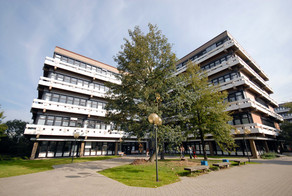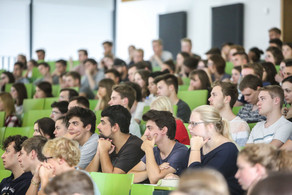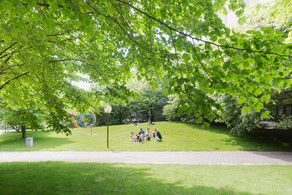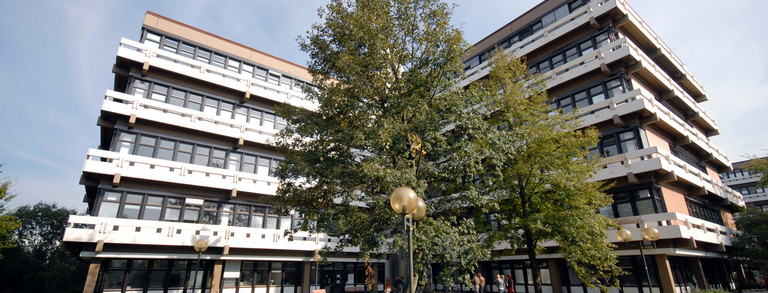Prof. Dr. Joachim Hüffmeier
Arbeitsschwerpunkte
- Konflikte und Verhandlungen
- Motivation und Leistung bei der Teamarbeit
- Arbeit und Gesundheit
- Open Science und die Replizierbarkeit von
Forschungsbefunden - Umweltfreundliches/nachhaltiges Verhalten
Sprechzeiten
Während der Vorlesungszeit:
Dienstags, 12:00 - 13:00 Uhr.
In der vorlesungsfreien Zeit:
Nach Vereinbarung.
Weitere Informationen
-
02/2024 - 07/2024: Visiting Professor, Department of Sport Science and Physical Education
University of Agder, Kristiansand, Norwegen -
10/2018 - 03/2019: Visiting Professor, Section Leadership and Management
University of Amsterdam Business School -
seit 03/2015: Professor für Sozial-, Arbeits- und Organisationspsychologie
TU Dortmund -
10/2014 - 02/2015: Elternzeit
-
03/2013 - 02/2015: Wissenschaftlicher Leiter des Fachbereichs „Grundsatzfragen und Programme“
Bundesanstalt für Arbeitsschutz und Arbeitsmedizin (BAuA), Dortmund -
2013: Habilitation im Fach Psychologie (fachliche Ausrichtung im Bereich der Organisations- und Wirtschaftspsychologie)
Westfälische Wilhelms-Universität Münster -
09/2012 - 03/2013: Elternzeit
-
09/2012 - 03/2013: Wissenschaftlicher Leiter des Fachbereichs „Grundsatzfragen und Programme“ (mit geringfügiger Stundenzahl parallel zur Elternzeit)
Bundesanstalt für Arbeitsschutz und Arbeitsmedizin (BAuA), Dortmund -
09/2008 - 08/2012: Akademischer Rat in der Arbeitseinheit Organisations- und Wirtschaftspsychologie
Westfälische Wilhelms-Universität Münster -
2008: Promotion zum Dr. rer. nat. im Bereich der Sozialpsychologie
Universität Trier -
2007: Gastwissenschaftler im Department of Management and Organizations
Kellogg School of Management, Northwestern University; Evanston, Illinois (USA) -
2004 - 2008: Wissenschaftlicher Mitarbeiter in zwei DFG-geförderten Forschungsprojekten an den Professuren für Sozialpsychologie
Universität Trier und Universität Kiel -
2004: Diplom in Psychologie (Schwerpunkte in Arbeits- und Organisations- sowie Sozialpsychologie)
Westfälische Wilhelms-Universität Münster -
1998 - 2004: Studium der Psychologie (Diplomstudiengang)
Westfälische Wilhelms-Universität Münster und University of Dundee (Schottland)
Artikel in Zeitschriften mit Gutachtersystem
† = kennzeichnet geteilte Erstautor:innenschaft, * = kennzeichnet angeleitete Studierende
- Koppenborg, M., Hüffmeier, J., & Klingsieck, K. B. (Registered Report - accepted in principle). Can group work prevent procrastination among students? British Journal of Educational Psychology.
- Mazei, J., Bear, J., & Hüffmeier, J. (Registered Report - accepted in principle). Explaining gender differences in negotiation: A close replication of Amanatullah and Morris (2010). Journal of Experimental Psychology: General.
- Wallrich, L., Torka, A.-K., & Hüffmeier, J. (Registered Report – accepted in principle). Estimating the replicability of research and the prevalence of selective reporting in Industrial, Work, and Organizational Psychology: A registered report. Advances in Methods and Practices in Psychological Science.
- - - - - - Kühner, C., Gemmecke, C., Hüffmeier, J., & Zacher, H. (accepted). Climate change anxiety: A meta-analysis. Global Environmental Chance.
- Kühner, C., Hüffmeier, J., & Zacher, H. (accepted). Environmental sustainability at work: It’s time to unleash the full potential of Industrial and Organizational Psychology. Industrial and Organizational Psychology.
- Mann, M., Warsitzka, M., Trötschel, R., & Hüffmeier, J. (accepted). How, when, and why do negotiators use reference points? A qualitative interview study with negotiation experts. International Journal of Conflict Management.
- Mazei, J., Grabowski, J., & Hüffmeier, J. (accepted). Which strategy to implement? Expanding the knowledge on the specific strategies that women do (not) use in salary negotiations. Negotiation and Conflict Management Research.
- Mazei, J., Rudolph, C., Zacher, H., & Hüffmeier, J. (accepted). Don’t put all of your eggs in one basket: Multiverse analysis in applied psychology. Journal of Applied Psychology.
- Burtscher, M., & Hüffmeier. J. (2025). Effects of individualizing incentives on team formation in science. Team Performance Management, 31(3-4), 226-246.
- Gemmecke, C., Kühner, C., Zacher, H., & Hüffmeier, J. (2025). Prompting change: A systematic review and meta-analysis of the (un)confounded effects of prompts on pro-environmental behavior. Applied Psychology: An International Review, 74(2), e70003.
- Halfmann, E., Hüffmeier, J., Faber, N., & Häusser, J. (2025). Sleep deprivation and negotiation. Collabra: Psychology, 11(1), 128507.
- Halfmann, E., Hüffmeier, J., Faber, N., & Häusser, J. (2025). The switch to daylight saving time and the perceived inappropriateness of norm violations. Social Psychology, 56(1), 1–13.
- Kühner, C., Gemmecke, C., Hüffmeier, J., & Zacher, H. (2025). Climate change anxiety: A meta-analysis. Global Environmental Chance, 93, 103015.
- Posch, M., Hüffmeier, J., Cevik, A., John, J., & Zacher, H. (2025). (How) Would you continue working? A comparison of responses to the lottery question and a Basic Income question. Zeitschrift für Arbeits- und Organisationspsychologie, 69(1), 1-14.
- Hüffmeier, J. & Kühner, C. (2024). Replication marketplaces would help science to become more self-correcting. Royal Society Open Science, 11, 240850.
- Hünefeld, L., Lück, M., Möller, H., Kopatz, F., & Hüffmeier, J. (2024). Determinants of work intensity in three service sectors. Journal of Service Management Research, 8(1), 29-49.
- Jäckel, E., Zerres, A., & Hüffmeier, J. (2024). Active listening in integrative negotiation. Communication Research, online published February, 14, 00936502241230711.
- Koppenborg, M., Klingsieck, K. B., & Hüffmeier, J. (2024). Conjunctive and additive group work reduce academic procrastination: Insights from a vignette study. Current Psychology, 43(2), 997-1010.
- Mann, M.,† Warsitzka, M.,† Hüffmeier, J., & Trötschel, R. (2024). United we stand: A principle-based negotiation training for collective bargaining. International Journal of Conflict Management, 35(2), 427-452.
- Mertes, M., Böhm, R., & Hüffmeier. J. (2024). Popular support for the no-concessions policy in terrorist hostage takings. Collabra: Psychology, 10(1), 124482.
- Ribbat, M., Klasmeier, K., & Hüffmeier, J. (2024). Empirical followership research since the publication of the Formal Theory of Followership by Uhl-Bien et al. (2014) - a systematic review. Collabra: Psychology, 10(1), 1-32.
- Schleu, J. E., Krumm, S., Zerres, A., & Hüffmeier, J. (2024). High performers = better leaders? Evidence from 55 years of professional soccer on the validity of performance-based promotion to leader positions. Journal of Business and Psychology, 39(2), 471-495 .
- Torka, A.-K.,† Hüffmeier, J.,† Fischer, S., & Braun, C. (2024). Social comparison, social indispensability, or both? On the psychological mechanisms underlying effort gains in swimming relays. Journal of Sport & Exercise Psychology, 46(6), 341-352.
- Häusser, J. A., Halfmann, E., & Hüffmeier, J. (2023). Negotiating through the night: How sleep deprivation can impair negotiation outcomes. Negotiation and Conflict Management Research, 16(2), 189-210.
- Hüffmeier, J., & Mertes, M. (2023). Unfortunately, journals in Industrial, Work, and Organizational Psychology still fail to support Open Science Practices. Meta-Psychology, 7, MP.2022.3271.
- Lietz, M., Mazei, J., Mertes, M., & Hüffmeier, J. (2023). Are strategies for women in compensation negotiations more appealing when it is explained how they are meant to impact negotiation outcomes? Psychology of Women Quarterly, 47(1), 80-112.
- Mazei, J., Backhaus, N., Wöhrmann, A., Brauner-Sommer, C. & Hüffmeier, J. (2023). Similar, but different: Gender differences in working time arrangements and the work–life interface. Collabra: Psychology, 9(1), 87546.
- Mazei, J., Bear, J. B., & Hüffmeier, J. (2023). When and why do men negotiate assertively? It depends on specific threats to their masculinity and the negotiation topic. Psychology of Men and Masculinities, 24(2), 137–148.
- Mertes, M. Kunz, D., & Hüffmeier, J. (2023). A deep dive into distributive concession making and the likelihood of impasses in negotiation. Collabra: Psychology, 9(1), 88929.
- Montano, D., Schleu, J. E., & Hüffmeier, J. (2023). A meta-analysis of the relative contribution of leadership styles to followers’ mental health. Journal of Leadership and Organizational Studies, 30(1), 90-107.
- Ribbat, M., Nohe, C., & Hüffmeier, J. (2023). Followership styles scrutinized: Temporal consistency and relationships with job attitudes and self-efficacy. PeerJ, online published October, 27:11:e16135.
- Torka, A.-K., Mazei, J., Bosco, F., Cortina, J., Götz, M., Kepes, S., O’Boyle, E., & Hüffmeier, J. (2023). How well are open science practices implemented in industrial and organizational psychology and management? European Journal of Work and Organizational Psychology, 32(4), 461–475.
- Torka, A.-K., Mazei, J., & Hüffmeier, J. (2023). Are replications mainstream now? A comparison of support for replications expressed in the policies of social psychology journals in 2015 and 2022. Social Psychological Bulletin, 18, 1-22.
- Braun, C., Fischer, S. & Hüffmeier, J. (2022). Larger effort gains in weaker relay swimmers independent of their starting order. Psychology of Sport and Exercise, 62, 102235.
- Hüffmeier, J., Hertel, G., Torka, A.-K., Nohe, C., & Krumm, S. (2022). In field settings group members (often) show effort gains instead of social loafing. European Review of Social Psychology, 33(1), 131-170.
- Hüffmeier, J., Torka, A.-K., Jäckel, E., & Schäpers P. (2022). Open science practices: Urban legends, misconceptions, and a false dichotomy. Industrial and Organizational Psychology: Perspectives on Science and Practice, 15, 520-524.
- Jäckel, E., Zerres, A., Hemshorn de Sanchez, C. S., Lehmann-Willenbrock, N., & Hüffmeier, J. (2022). NegotiAct: Introducing a comprehensive coding scheme to capture temporal interaction patterns in negotiations. Group and Organization Management, 49(4), 1-41.
- Mann, M., Warsitzka, M., Zhang, H., Hüffmeier, J. & Trötschel, R. (2022). When control does not pay off: The dilemma between trade-off opportunities and budget restrictions in B2B negotiations. Negotiation and Conflict Management Research, 15(4).
- Mazei, J., Bear, J., & Hüffmeier, J. (2022). Avoiding backlash or proving one’s manhood? Beliefs about gender differences in negotiation. Group Decision and Negotiation, 31, 81-110.
- Mertes, M., Mazei, J., Gemmecke, C., & Hüffmeier, J. (2022). Short-term effects of authority concessions to terrorist hostage-takers: Replicating and extending the concession effect. Negotiation and Conflict Management Research, 15(2), 124-147.
- Nohe, C., Hüffmeier, J., Bürkner, P., Mazei, J., Sondern, D., Runte, A., Sieber, F., & Hertel, G. (2022). Unethical choice in negotiations: A meta-analysis on gender differences and their moderators. Organizational Behavior and Human Decision Processes, 173, 104189.
- Hüffmeier, J. & Zacher, H. (2021). The Basic Income: Initiating the needed discussion in Industrial, Work, and Organizational Psychology. Industrial and Organizational Psychology: Perspectives on Science and Practice, 14, 531-562.
- Mazei, J. & Hüffmeier, J. (2021). Women ask less often than men because they work fewer hours: A commentary on Artz et al. (2018). Meta-Psychology, 5, MP.2020.2535.
- Mazei, J., Zerres, A., & Hüffmeier, J. (2021). Masculinity at the negotiation table: A theory of men's negotiation behaviors and outcomes. Academy of Management Review, 46, 108-121.
- Ribbat, M., Krumm, S., & Hüffmeier, J. (2021). Validation of a German version of Kelley’s (1992) Followership Questionnaire. Psychological Test Adaptation and Development, 2(1), 1-13.
- Torka, A.-K., Mazei, J., & Hüffmeier, J. (2021). Together, everyone achieves more—or, less? An interdisciplinary meta-analysis on effort gains and losses in teams. Psychological Bulletin, 147, 504-534.
- Breuer, C., Hüffmeier, J., Hibben, F., & Hertel, G. (2020). Trust in teams: A taxonomy of perceived trustworthiness factors and risk-taking behaviors in face-to-face and virtual teams. Human Relations, 73, 3-34.
- Buttrick, N. R., Aczcel, B., Aeschbach, L. F., Bakos, B.,… Hüffmeier, J. ... & Wood, M. (2020). Many Labs 5: Registered Replication Report of Vohs & Schooler (2008), Study 1., Advances in Methods and Practices in Psychological Science, 3, 429-438.
- Ebersole, C.R., Mathur, M. B., ..., Hüffmeier, J., ... Nosek, B.A. (2020). Many Labs 5: Testing pre-data collection peer review as an intervention to increase replicability. Advances in Methods and Practices in Psychological Science, 3, 309-331.
- Geiger, I. & Hüffmeier, J. (2020). “The more, the merrier” or “less is more”? How the number of issues addressed in B2B sales negotiations affects dyadic and seller economic outcomes. Industrial Marketing Management, 87, 90-105.
- Hüffmeier, J., Schleu, J. E., & Nohe, C. (2020). The strength of the situation: Disentangling the situational explanation for effort gains in swimming relays from person-related accounts. Journal of Sport and Exercise Psychology, 42, 394-406.
- Hüffmeier, J., Stern, J., & Schultze, T. (2020). When mistakes affecting one’s own group result in compensation: Evidence of a compensatory own goal effect. Psychology of Sport & Exercise, 48, 101633.
- Kappes, C., Häusser, J. A., Mojzisch, A., & Hüffmeier, J. (2020). Age differences in negotiations: Older adults achieve poorer joint outcomes in integrative negotiations. Journal of Experimental Psychology: General, 149, 2102-2118.
- Landy, J. F., Jia., M., Ding, I. L., Viganola, D., Tierney, W., ..., Hüffmeier, J., ..., & Uhlmann, E. L. (2020). Crowdsourcing hypothesis tests: Making transparent how design choices shape research results. Psychological Bulletin, 146, 451-479.
- Mazei, J., Mertes, M., & Hüffmeier, J. (2020). Strategies aimed at reducing gender differences in negotiation are perceived by women as ineffective. Sex Roles, 83, 580-594.
- Mertes, M., Mazei, J., & Hüffmeier, J. (2020). "We do not negotiate with terrorists!" But what if we did? Peace and Conflict: Journal of Peace Psychology, 26, 437-448.
- Mühlenbrock, I. & Hüffmeier, J. (2020). Differential work design for different age groups? A systematic literature review of the moderating role of age in the relation between psychosocial work characteristics and health. Zeitschrift für Arbeits- und Organisationspsychologie, 64, 171-195.
- Schäpers, P., Lievens, F., Freudenstein, J.-P., Hüffmeier, J., König, C., & Krumm, S. (2020). Removing situation descriptions from situational judgment test items: Does the impact differ for video-based versus text-based formats? Journal of Occupational and Organizational Psychology, 93, 472-494.
- Schleu, J. E. & Hüffmeier, J. (2020). Simply the best? A systematic literature review on the predictive validity of employee performance for leader performance. Human Resource Management Review. Advance online publication.
- Tierney, W., Hardy, J., Ebersole, C. R., Leavitt, K. Viganola, D., ..., Uhlmann, E. L. (2020). Creative destruction in science. Organizational Behavior and Human Decision Processes, 161, 291-309. [Member of forecasting collaboration].
- Hüffmeier, J., & Mazei, J. (2019). Symmetrical conflicts also allow for the investigation of attack and defense. Behavioral and Brain Sciences, 42, E125.
- Hüffmeier, J., † Zerres, A., † Freund, P. A., Backhaus, K., Trötschel, R., & Hertel, G. (2019). Strong or weak synergy? Revising the assumption of team-related advantages in integrative negotiations. Journal of Management, 45, 2721-2750.
- Hünefeld, L., Gerstenberg, S., & Hüffmeier, J. (2019). Job satisfaction and mental health of temporary agency workers in Europe: A review and research agenda. Work & Stress, 34, 82-110.
- Krumm, S., Hüffmeier, J. & Lievens, P. (2019). Experimental test validation: Examining the path from test elements to test performance. European Journal of Psychological Assessment, 35, 225-232.
- Schleu, J. E., Mojzisch, A., & Hüffmeier, J. (2019). Run for the team: An analysis of effort gains in track and field relays. Psychology of Sports and Exercise, 45, 101567.
- Hauk, N., Hüffmeier, J., & Krumm, S. (2018). Ready to be a silver surfer? A meta-analysis on the relationship between chronological age and technology acceptance. Computers in Human Behavior, 84, 304-319.
- Hertel, G., Nohe, C., Wessolowski, K., Meltz, O., Pape, J., Fink, J., & Hüffmeier, J. (2018). Effort gains in occupational teams - The effects of social competition and social indispensability. Frontiers in Psychology, 9, 769.
- Hüffmeier, J. & Krumm, S. (2018). No myth far and wide: Relay swimming is faster than individual swimming and the conclusion of Skorski et al. (2016) is unfounded. Meta-Psychology, 2.
- Hüffmeier, J., Filusch, M., Mazei, J., Hertel, G., Mojzisch, A., & Krumm, S. (2017). On the boundary conditions of effort losses and effort gains in action teams. Journal of Applied Psychology, 102, 1673-1685.
- Montano, D., Reeske, A., Franke, F., & Hüffmeier, J. (2017). Leadership, followers' mental health and job performance in organizations: A comprehensive meta‐analysis from an occupational health perspective. Journal of Organizational Behavior, 38, 327-350.
- Breuer, C., Hüffmeier, J. & Hertel, G. (2016). Does trust matter more in virtual teams? A meta-analysis on virtuality as a moderator of the relationship between trust and team effectiveness. Journal of Applied Psychology, 101, 1151-1177.
- Hüffmeier, J., Mazei, J., & Schultze, T. (2016). Reconceptualizing replication as a sequence of different studies: A replication typology. Journal of Experimental Social Psychology, 66, 81-92.
- Mojzisch, A., Schultze, T., Hüffmeier, J., & Schulz-Hardt, S. (2016). Differentiation of selves: Differentiating a fuzzy concept. Behavioral and Brain Sciences, 39, e159.
- Krumm, S., Lievens, F., Hüffmeier, J., Lipnevich, A. A., Bendels, H., & Hertel, G. (2015) How “situational” is judgment in situational judgment tests? Journal of Applied Psychology, 100, 399-416.
- Mazei, J., † Hüffmeier, J., † Freund, P. A., Stuhlmacher, A., Bilke, L.* & Hertel, G. (2015). A meta-analysis on gender differences in negotiation outcomes and their moderators. Psychological Bulletin, 141, 85-104.
- Hüffmeier, J., Freund, P. A., Zerres, A., Backhaus, K. & Hertel, G. (2014). Being tough or being nice? A meta-analysis on hard- and softline strategies in distributive negotiations. Journal of Management, 40, 866-892.
- Hüffmeier, J., Wessolowski, K., van Randenborgh, A., Bothin, J.*, Schmidt-Loertzer, N.* & Hertel, G. (2014). Social support from fellow group members triggers additional effort in groups. European Journal of Social Psychology, 44, 287-296.
- Hüffmeier, J., Dietrich, H.* & Hertel, G. (2013). Effort intentions in teams: Effects of task type and teammate performance. Small Group Research, 44, 62-88.
- Hüffmeier, J., Kanthak, J.* & Hertel, G. (2013). Specificity of partner feedback as moderator of group motivation gains in Olympic swimmers. Group Processes and Intergroup Relations, 16, 516-525.
- Trötschel, R., Bündgens, S., Hüffmeier, J. & Loschelder, D. D. (2013). Promoting prevention success at the bargaining table: Regulatory focus in distributive negotiations. Journal of Economic Psychology, 38, 26-39.
- Zerres, A.,† Hüffmeier, J.,† Freund, P. A., Backhaus, K. & Hertel, G. (2013). Does it take two to tango? Longitudinal effects of unilateral and bilateral integrative negotiation training. Journal of Applied Psychology, 98, 478-491.
- Hüffmeier, J. & Hertel, G. (2012a). Erfolgreich verhandeln: Das integrative Phasenmodell der Verhandlungsführung. Psychologische Rundschau, 63, 145-159.
- Hüffmeier, J., Krumm, S., Kanthak, J.* & Hertel, G. (2012). “Don’t let the group down”: Facets of instrumentality moderate the motivating effects of groups in a field experiment. European Journal of Social Psychology, 42, 533-538.
- Van Randenborgh, A., Hüffmeier, J., Victor, D., Klocke, K., Borlinghaus, J., & Pawelzik, M. (2012). Contrasting chronic with episodic depression: An analysis of distorted socio-emotional information processing in chronic depression. Journal of Affective Disorders, 141, 177-184.
- Hüffmeier, J. & Hertel, G. (2011a). When the whole is more than the sum of its parts: Group motivation gains in the wild. Journal of Experimental Social Psychology, 47, 455-459.
- Hüffmeier, J. & Hertel, G. (2011b). Many cheers make light the work: How social support triggers process gains. Journal of Managerial Psychology, 26, 285-204.
- Hüffmeier, J., Krumm, S. & Hertel, G. (2011). The practitioner-researcher divide in psychological negotiation research: Current state and future perspective. Negotiation and Conflict Management Research, 4, 145-168.
- Krumm, S., Hüffmeier, J., Dietz, F., Findeisen, A., & Dries, C. (2011). Towards positive test takers’ reactions to cognitive ability assessments: Development and initial validation of the reasoning ability at work test. Journal of Business and Media Psychology, 2, 11-18.
- Trötschel, R., Hüffmeier, J., Loschelder, D. D., Schwartz, K. & Gollwitzer, P. (2011). Perspective taking as a means to overcome motivational barriers in negotiations: When putting oneself in the opponent's shoes helps to walk towards agreements. Journal of Personality and Social Psychology, 101, 771-790.
- Zerres, A., & Hüffmeier, J. (2011). Too many cooks spoil the soup: How negotiating teams deteriorate the negotiators’ relationship. Die Betriebswirtschaft, 71, 559-575.
- Trötschel, R., Hüffmeier, J., & Loschelder, D. D. (2010). When yielding pieces of the pie is not a piece of cake: Identity-based intergroup effects in negotiations. Group Processes and Intergroup Relations, 6, 751-763.
- Van Randenborgh, A., Hüffmeier, J., LeMoult, J., & Joormann, J. (2010). Letting go of unmet goals: Does self-focused rumination impair goal disengagement? Motivation and Emotion, 34, 325-332.
- Van Randenborgh, A., de Jong-Meyer, R., & Hüffmeier, J. (2010). Decision making in depression: Differences in decisional conflict between healthy and depressed individuals. Clinical Psychology & Psychotherapy, 17, 285-298.
- Van Randenborgh, A., de Jong-Meyer, R., & Hüffmeier, J. (2010). Rumination impairs decision making. Journal of Clinical Psychology, 66, 229-248.
Buchkapitel und Onlinepublikationen
- Hüffmeier, J. & Torka, A.-K. (2022). Leidet die Motivation bei der Arbeit im Team? Forschung & Lehre. Can be retrieved from https://www.forschung-und-lehre.de/karriere/leidet-die-motivation-bei-der-arbeit-im-team-4659
- Torka, A.-K., Mazei, J., & Hüffmeier, J. (2022). Why some teams boost motivation while others totally sap it. Psyche. Can be retrieved from https://psyche.co/ideas/why-some-teams-boost-motivation-while-others-totally-sap-it
- Hertel, G., & Hüffmeier, J. (2020). Social indispensability and social competition as triggers of effort gains in teams. In S. Karau (Ed.), Individual Motivation within Groups: Performance in Work, Academic, and Sports Teams. New York: Academic Press.
- Hüffmeier, J., & Hertel, G. (2020). Effort losses and effort gains in sports teams. In S. Karau (Ed.), Individual Motivation within Groups: Performance in Work, Academic, and Sports Teams. New York: Academic Press.
- Mazei, J., Reif, J. A. M., Kugler, K. G. & Hüffmeier, J. (2019). Warum sich Frauen und Männer in Verhandlungen unterscheiden. Das In-Mind Magazin.
- Hüffmeier, J., & Schleu, J. E. (2018). Group motivation. In D. Hackfort, R. Schinke, & B. Strauss (Eds.). International Dictionary of Sport Psychology. Amsterdam: Elsevier.
- Hertel, G., & Hüffmeier, J. (2014). Erfolgreiche Teamarbeit: Wirkmechanismen und Rahmenbedingungen. In H. Schuler & K. Moser (Hrsg.). Lehrbuch Organisationspsychologie (5. Auflage, S. 219-262). Bern: Huber.
- Zerres, A., & Hüffmeier, J. (2013). “Gemeinsam sind wir stark” – Über Nutzen und Schaden von Verhandlungen in Teams. Themenausgabe „Verhandlungen“. Das In-Mind Magazin, 1.
- Hüffmeier, J. & Hertel, G. (2012). „Einer für alle“ – Kann Verantwortung für ein Team die individuelle Anstrengung im Hochleistungssport steigern? Themenausgabe „Sportliches Verhalten verstehen“. Das In-Mind Magazin, 1.
- Hüffmeier, J., & Hertel, G. (2011). Creativity in negotiations. In M. Benoliel (Ed.). Negotiation excellence: Successful deal making (pp. 79-98). Hackensack, NJ: World Scientific Publishing.
-
seit 03/2024: Industrial and Organizational Psychology
Associate Editor -
seit 01/2022: Negotiation and Conflict Management Research
Mitglied des Editorial Board -
seit 03/2021: Social Psychology
Mitglied des Editorial Board -
seit 10/2018: Journal of Occupational and Organizational Psychology
Mitglied des Editorial Board -
seit 01/2016: Group & Organization Management
Mitglied des Editorial Board -
2015 - 2018: Journal of Economic Psychology
Associate Editor
2024
DFG:
“Asking tactically for an ‛other-promotion’ (ATOP): Exploring the effectiveness and applicability of a novel strategy for women in negotiation“ (gemeinsam mit Dr. Jens Mazei [PI]; MA 9683/3-2)
(Umfang: 302.384 €)
2023
Best Paper Award des 21. Kongress’ der European Association of Work and Organisational Psychology (EAWOP)
für den folgenden Beitrag:
Jäckel, E., Zerres, A. & Hüffmeier, J. (2023, Mai). Behavioral antecedents and consequences of (dis-)honesty in negotiation. 21. Kongress der European Association of Work and Organisational Psychology (EAWOP), Kattowitz, Polen.
2023
Nominierung für den Best Paper Award des 21. Kongress’ der European Association of Work and Organisational Psychology (EAWOP)
für den folgenden Beitrag:
Torka, A.-K., Mazei, J., Bosco, F., Cortina, Jose, Götz, M., Kepes, S., O’Boyle, E. & Hüffmeier, J. (2023, Mai). On the current implementation of Open Science Practices in Industrial and Organizational Psychology and Management. 21. Kongress der European Association of Work and Organisational Psychology (EAWOP), Kattowitz, Polen.
2022
Nominierung für den Best Article Award des Academy of Management Review für das Jahr 2021
für den folgenden Beitrag:
Mazei, J., Zerres, A., & Hüffmeier, J. (2021). Masculinity at the negotiation table: A theory of men's negotiation behavior and outcomes. Academy of Management Review, 46, 108-121.
2022
DFG:
“Explaining gender differences in negotiation: A close replication and extension of Amanatullah and Morris (2010)“ (MA 9683/2-1, gemeinsam mit Dr. Jens Mazei [PI])
(Umfang: 36.600 €)
2021
DFG:
"Schlafmangel und Kompensationseffekte in Verhandlungen" (HU 1772/6-2, gemeinsam mit Prof. Dr. Jan Häusser)
(Umfang eigener Projektmittel: 93.800 €)
2020
Alexander von Humboldt-Stiftung:
Georg-Forster-Forschungsstipendium für Dr. Fabian Ugwu (Alex Ekwueme Federal University, Ndufu-Alike, Nigeria) für einen 18-monatigen Aufenthalt am Lehrstuhl
2019
DFG:
"About the causes of irrational negotiation impasses"
(Umfang: 272.000 €)
2019
Schöller Fellowship (Auszeichnung durch das Dr. Theo und Friedl Schöller Forschungszentrum für Wirtschaft und Gesellschaft)
2018
DFG:
"Effekte von Schlafmangel in Verhandlungen mit integrativem Potenzial" (gemeinsam mit Prof. Dr. Jan Häusser [PI])
(Umfang: 256.400 €)
2018
MERCUR:
"Männer und ihre Männlichkeit in Verhandlungen"
(Umfang: 29.900 €)
2017
DFG:
"Zwei Seiten derselben Medaille? Motivationsgewinne und -verluste in Teams"
(Umfang: 88.800 €)
2017
Best Student Paper Award des 30. jährlichen Kongress' der International Association for Conflict Management (IACM)
für den folgenden Beitrag:
Mertes, M. & Hüffmeier, J. (2017, Juli). Why Negotiators Leave the Table: A Grounded Theory Approach Towards Understanding Negotiation Impasse. 30. Jährlicher Kongress der International Association for Conflict Management (IACM), Berlin, Deutschland.
2015
Innovationspreis der Fachgruppe für Arbeits-, Organisations- und Wirtschaftspsychologie der Deutschen Gesellschaft für Psychologie
(gemeinsam mit Prof. Dr. Guido Hertel)
2013
Best Student Paper Award des 26. jährlichen Kongress der International Association for Conflict Management (IACM)
für den folgenden Beitrag:
Mazei, J., Hüffmeier, J., Freund, P. A., Stuhlmacher, A. F., Bilke, L. & Hertel, G. (2013, Juni). Gender differences in negotiation outcomes: A meta-analysis on main and moderator effects. 26. Jährlicher Kongress der International Association for Conflict Management (IACM), Tacoma, USA.
2013
Nominierung für den Best Paper Award des 16. Kongress’ der European Association of Work and Organisational Psychology (EAWOP)
für den folgenden Beitrag:
Kanthak, J., Hüffmeier, J., Krumm, S. & Hertel, G. (2013, Mai). “Don’t let the group down”: Facets of instrumentality moderate the motivating effects of groups in a field experiment. 16. Kongress der European Association of Work and Organisational Psychology (EAWOP), Münster, Deutschland.
2012
DFG:
„Prozessgewinne in Teamverhandlungen durch explizite Zuweisung von Teilaufgaben“
(Umfang: 142.700 €)
2011
Evaluationspreis für das beste Seminar im Fachbereich Psychologie
Westfälische Wilhelms-Universität Münster für das Sommersemester 2011






